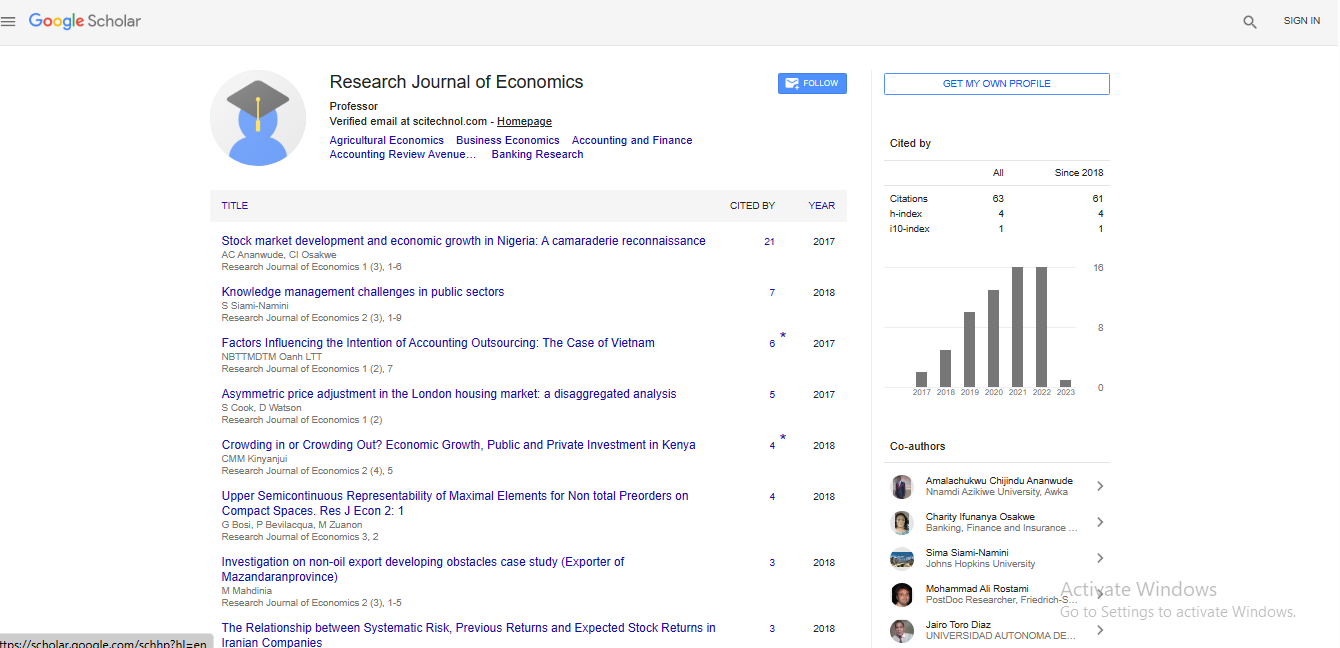Commentary, Res J Econ Vol: 7 Issue: 3
The Role of Business Economics in Modern Enterprises
Jinxin Jian*
Department of Economics, Wenzhou-Kean University, Wenzhou, China
*Corresponding Author: Jinxin Jian
Department of Economics
Wenzhou-Kean University
Wenzhou, China
E-mail: jianxin@jj.cn
Received date: 28 April, 2023, Manuscript No. RJE-23-102320;
Editor assigned date: 02 May, 2023, PreQC No. RJE-23-102320 (PQ);
Reviewed date: 16 May, 2023, QC No. RJE-23-102320;
Revised date: 23 May, 2023, Manuscript No. RJE-23-102320 (R);
Published date: 30 May, 2023 DOI: 10.4172/RJE.1000148
Citation: Jian J (2023) The Role of Business Economics in Modern Enterprises. Res J Econ 7:3.
Description
Business management plays an important role in shaping the strategy and decision-making of modern companies. It provides valuable insight into market dynamics, cost analysis, pricing strategy and resource allocation. This study examines the importance of business management in successfully operating a business and maximizing profitability.
Business administration uses economic theory and quantitative techniques to evaluate the specific factors that affect business (business organization, management, expansion, strategy). Research topics in business management may include how and why firms expand, the influence of entrepreneurs, interactions between firms, and the role of government in regulation.
Business economics is the study of all the variables that impact a company's operations, management, and financial success. Business economics has a broad reach since it deals with both internal business issues and external elements that are out of the control of the firm owner.
Understanding market dynamics
Business administration helps companies understand the complex functioning of the market. By analyzing supply and demand patterns, companies can make informed decisions about production levels, pricing strategies, entering or exiting markets. Market research, demand forecasting, and competitive analysis are key elements of business management that enable companies to identify opportunities and anticipate challenges.
Cost analysis and optimization
Efficient cost management is essential for sustainable business success. Business management helps companies to assess and control costs through various techniques such as cost-volume-benefit analysis, break-even analysis, and frontier analysis. By understanding cost structures, businesses can optimize resource allocation, streamline operations, and increase overall profitability.
Pricing strategies
Pricing has a significant impact on a company's sales and market position. Business management provides the tools and framework conditions for determining optimal pricing strategies. Concepts such as price elasticity of demand, price differentiation, and competitive pricing analysis help to set prices that maximize profits while considering market conditions and customer behavior.
Investment analysis
Business administration also helps evaluate investment opportunities. Capital budgeting techniques such as Net Present Value (NPV) analysis, Internal Rate of Return (IRR) analysis and payback period analysis enable companies to assess the profitability and feasibility of potential investments. These tools enable companies to make informed decisions about whether to pursue or reject investment projects.
Risk management
Every business faces inherent risks, and business management helps organizations identify, assess and mitigate those risks. Tools such as risk analysis, sensitivity analysis, and scenario planning help organizations quantify potential risks and develop strategies to minimize their impact. This enables better decision-making and proactive risk management, reducing the chance of unexpected setbacks.
Government policy analysis
Government policies have a significant impact on business operations, and understanding their impact is critical to effective decision-making. Business administration provides tools for analyzing government regulations, taxation and trade restrictions. By understanding the economic impact of these policies, organizations can adjust their strategies and ensure compliance while minimizing potential negative impacts.
Supply chain management
Efficient supply chain management is essential for optimizing production and sales processes. Business management helps companies identify bottlenecks, streamline logistics, and reduce costs associated with supply chains. Concepts such as economies of scale, Just-In-Time (JIT) inventory management, and outsourcing decisions are critical to achieving operational efficiency and customer satisfaction.
Forecasting and planning
Accurate forecasting is essential for effective business planning. Business management provides companies with the skills to anticipate future market trends, sales volumes, and resource requirements. By leveraging quantitative models, statistical analysis, and historical data, organizations can make informed decisions about expanding capabilities, allocating resources, and overall strategic planning.
Conclusion
Business administration serves as a directional framework for decision-making in modern enterprises. By understanding market dynamics, analyzing costs, developing pricing strategies, evaluating investments, managing risks, and aligning with government policies, organizations can streamline operations, increase profitability, and compete. In an increasingly complex and dynamic business environment, the integration of business principles is critical for companies aiming for sustainable growth and success.
 Spanish
Spanish  Chinese
Chinese  Russian
Russian  German
German  French
French  Japanese
Japanese  Portuguese
Portuguese  Hindi
Hindi 